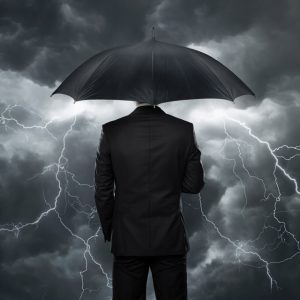This is a serious storm. Everyone in the surrounding area is being evacuated. There are no nearby associate offices open. Thousands are expected to be without power. Your firm has an emergency management plan in place at HQ. It is likely another branch office or a central firm location has been designated to answer calls rerouted from the closed offices. The staff on the phones might not know your client, but they can access account data and help them.
How do clients find out?
You must assume clients need to be contacted several times for the message to sink in. They have other things on their minds. For a mandatory closure of several offices, the firm might send out blast emails to notify clients. Calls to the office will be automatically rerouted.
You want to take steps too. Think about this from a “no child left behind” mindset. Develop a plan to notify every client. Confirm your office phone is rerouting calls. Call clients to tell them. Send general emails. Your office likely has a plan in place. Realize the more direct and personal the contact, the less clients will think it’s a scam call.
What do clients need to preserve?
Most clients should have a centralized trove of “important papers,” the documents it would be difficult to replace. Credit cards and passports are important, too. You have a great deal of their account information and statements stored electronically by the firm.
Put another way, they do not need to carry five years of account statements with them. Bringing cash on hand and jewelry is a good idea if they need to evacuate, along with the medications they take on a regular basis.
Preparing Yourself and Your Family
If hurricanes and major storms are part of your seasonal weather patterns, you know what to do. In Florida, for example, many homes are built to be sealed up like bunkers, with metal panels protecting windows.
If the authorities tell you to evacuate, comply with their directive. After caring for your family and pets, pack those hard-to-replace documents like passports, drivers license, COVID vaccination cards and credit cards. Pack clothing as suggested by the authorities. Securing jewelry is a good idea, too.
Plan for power outages. Expect to be without power for a while.
Even if you are not in the direct path of the storm, you may get severe weather. This happens in plenty of areas. We live in Bucks County, Pennsylvania, about 40 miles from Philadelphia. We get the storms called Nor’easters. We have lost power for several days. We lose power more frequently than people in major cities. There are sensible steps you should take for preparation.
You can buy a whole house generator, but that is a major project and expense. You aren’t going to do that at the last moment. FYI: Ford says its F-150 Lightning All-Electric Truck has the ability to power your home as a backup.
If you lose power, you can visit a neighbor who has a backup generator. Stay with them for a few days. If your house is without heat and power, take advantage of daylight, go to sleep, and rise with the sun and remember the lessons learned in Boy and Girl Scouts.
A Few More Preparation and Survival Tips
- Consider keeping a landline phone. Buy external batteries for smartphones. You can recharge your phone in your car.
- You may lose water or water pressure. Fill several containers with tap water ahead of time. Keep some bottled water on hand.
- Washing and showering is a problem if you are not on public water and the water is not hot. One solution is to visit that neighbor with a generator. Another is to drive around and see if there are areas with power. Your gym might still have power!
- If you have electric appliances, you need a way to cook food. Your BBQ grill is a great resource. We also bought one a small burner fed by a small propane tank.
- Unfortunately, power tends to go out in the winter. Wood-burning fireplaces are warm to sit around, but they suck the heat out of the room and send it up your chimney! We light the fireplace located in a room that can be closed off from the rest of the house. Be sure the fire is completely out before going to bed. Shut the screens or glass doors.
- It makes sense to fill the gas tanks on your car(s) before the storm arrives. The car gives you mobility. It can keep you warm when you are driving around.
- You should have food on hand to last you for a few days. If you have an ice chest used for picnics, it is a good idea to buy ice ahead of time, so it can be used as a cooler. You want bottled water on hand along with your favorite beverages.
- Buy flashlights now when they are on sale at your supermarket or home improvement store. The LED ones are excellent. Ideally have at least one in every room.
- Almost everyone takes money electronically today. When you lose power, this stops. If a business has power and is open, they should be able to accept your credit card. Personally, I think having a stash of cash at home, maybe $100 in paper money, makes sense.
- Help your neighbors. One neighbor might be a prepper. They are fine. Another neighbor might be elderly. They might need help. Knock on their door. Make sure they are OK. Share what you have. Others will knock on your door too.
Storms happen. Life comes back to normal. Your life will resume, too.
Bryce Sanders is president of Perceptive Business Solutions Inc. He provides HNW client acquisition training for the financial services industry. His book, “Captivating the Wealthy Investor” is available on Amazon.









 September 28, 2022 at 09:29 PM
September 28, 2022 at 09:29 PM











